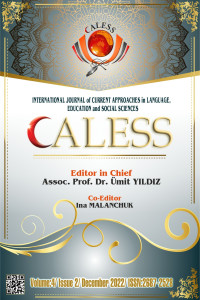Öz
Kaynakça
- Aleshchanova, I. V., Frolova, N. A., (2011). Ways of developing professional foreign language competence. Modern problems of science and education, 6.
- Baranova, А.Р., (2014). Learning English with the help of online video lessons. In: Innovative development of modern science: proceedings of the International Scientific and Practical Conference (pp. 31-33). Ufa, Tatarstan. Colley J., DeGani A., Stead G., (2010). What in the World Are You Doing with Your Mobile Phone? World Differences in the Use of Mobiles. Cambridge.
- Domen, J., Hornstra, L., Weijers, D., van der Veen, I. and Peetsma, T., (2020). Differentiated need support by teachers: Student‐specific provision of autonomy and structure and relations with student motivation. British Journal of Educational Psychology, 90, 2, 403-423.
Öz
Article reveals the opportunities of introducing mobile learning techniques in the course of collocations, etc. The term ‘Media education’ defines personality development via mass foreign language study in high school. Modern pedagogical technologies, which involve IT-technologies, Internet resources allow teachers to implement personally-customized teaching methods, thereby providing individual and differential teaching approach. Current teaching principles combine explicit and implicit methods. The former one represents the conscious and aware learning whereas the latter technique is to assimilate lexical units subconsciously, i.e. while participating in discussions, listening to live speech patterns, multiple repetition of useful speech media to acquire special communication skills, relevant perception and interpretation, develop creative abilities, critical thinking, analyze and assess media texts, learn different ways of self-expressing via various media techniques. User-friendly interface, modified information presentation are essential factors which facilitate a sophisticated complex educational process, making the study accessible, updated regularly, client-tailored, personalized. The technology of autonomous work with mobile devices is regarded as one of the promising ways for students to overcome the difficulties of learning activities. Mobile learning, based on the principle of guided interactive self-learning using mobile applications, has ample opportunities for activating and intensifying students' independent activities. The analysis of the use of mobile applications for learning a foreign language shows that motivation is an important factor in self-education.
Anahtar Kelimeler
Mobile Learning Media Education Customized Teaching Method Autonomous Work Mobile Applications
Kaynakça
- Aleshchanova, I. V., Frolova, N. A., (2011). Ways of developing professional foreign language competence. Modern problems of science and education, 6.
- Baranova, А.Р., (2014). Learning English with the help of online video lessons. In: Innovative development of modern science: proceedings of the International Scientific and Practical Conference (pp. 31-33). Ufa, Tatarstan. Colley J., DeGani A., Stead G., (2010). What in the World Are You Doing with Your Mobile Phone? World Differences in the Use of Mobiles. Cambridge.
- Domen, J., Hornstra, L., Weijers, D., van der Veen, I. and Peetsma, T., (2020). Differentiated need support by teachers: Student‐specific provision of autonomy and structure and relations with student motivation. British Journal of Educational Psychology, 90, 2, 403-423.
Ayrıntılar
| Birincil Dil | İngilizce |
|---|---|
| Konular | Özel Eğitim ve Engelli Eğitimi |
| Bölüm | Araştırma Makaleleri |
| Yazarlar | |
| Erken Görünüm Tarihi | 20 Ekim 2022 |
| Yayımlanma Tarihi | 30 Aralık 2022 |
| Yayımlandığı Sayı | Yıl 2022 Cilt: 4 Sayı: 2 |
calessjournal@gmail.com https://dergipark.org.tr/en/pub/caless

